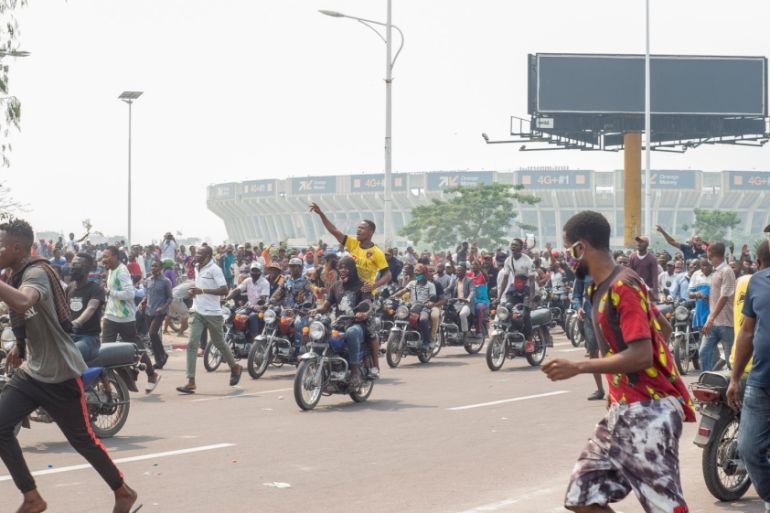DR Congo police use tear gas on protesters outside parliament
People take to the street for second consecutive day to protest against proposed changes to the judiciary.

Police in the Democratic Republic of the Congo’s (DRC) capital have fired tear gas for a second straight day to break up violent protests outside parliament over proposed changes in the judiciary.
The demonstrators, some armed with petrol bombs, blocked traffic outside parliament in Kinshasa on Wednesday, erecting barriers and burning tyres.
Police first fired warning shots and then used tear gas to disperse them, AFP news agency reported.
The protesters were mainly motorcycle taxi drivers and supporters of President Felix Tshisekedi’s Union for Democracy and Social Progress (UDPS) party.
The UDPS is in an uneasy coalition with forces close to Tshisekedi’s long-serving predecessor, Joseph Kabila. Only a third of the government ministers are from the UDPS.
The contested legal changes include proposals to define the powers of judges, which critics say is a ploy to muzzle the judiciary.
|
|
The proposals come from the Common Front for Congo (FCC), a coalition close to Kabila, who remains a behind-the-scenes force in national politics.
FCC chief Nehemie Mwilanya on Wednesday warned “those who think they have a monopoly on disorder and violence”.
“Careful!” he said. “They must realise that everyone knows how it starts, but not how it ends.”
Mwilanya also questioned the “inaction” of the interior minister, who is from Tshisekedi’s party, without naming him, saying he failed to understand why some people were following “scorched earth politics”.
Former parliament speaker Aubin Minaku, one of the people behind the proposed amendments, said the “aim is to define the authority the justice ministry exercises over the judges”.
But Tshisekedi’s party on Monday lambasted it as a ploy to “undermine the independence of the judiciary and increase the power of the justice ministry”.
The opposition Lamuka coalition also said the proposals would “deal a death blow to the concept of separation of powers”.
|
|
Separately, four influential grassroots organisations on Wednesday issued a joint statement warning that the country’s next presidential elections in 2023 were at risk of “manipulation” because of moves to appoint a new head of the national electoral commission.
The present head of the electoral panel, Corneille Nangaa, whose assets have been frozen by the United States on suspicion of corruption, is stepping down.
Nangaa’s organisation notably validated the results of the December 2018 presidential elections, which opposition leader Martin Fayulu said denied him of victory.
The joint statement warned against any attempt by the FCC-dominated parliament to push through Nangaa’s successor, and called on the public to oppose “any Machiavellian plan aimed at thrusting us into endless electoral crises”.
Its signatories comprise a highly influential Catholic group called the Lay Coordination Committee as well as the civil rights groups Lucha, Filimbi and Congolais Debout (Congolese, Stand Up).
Their supporters carried out a wave of anti-Kabila protests in late 2017 and early 2018 that were bloodily repressed by security forces, killing about 15 people.